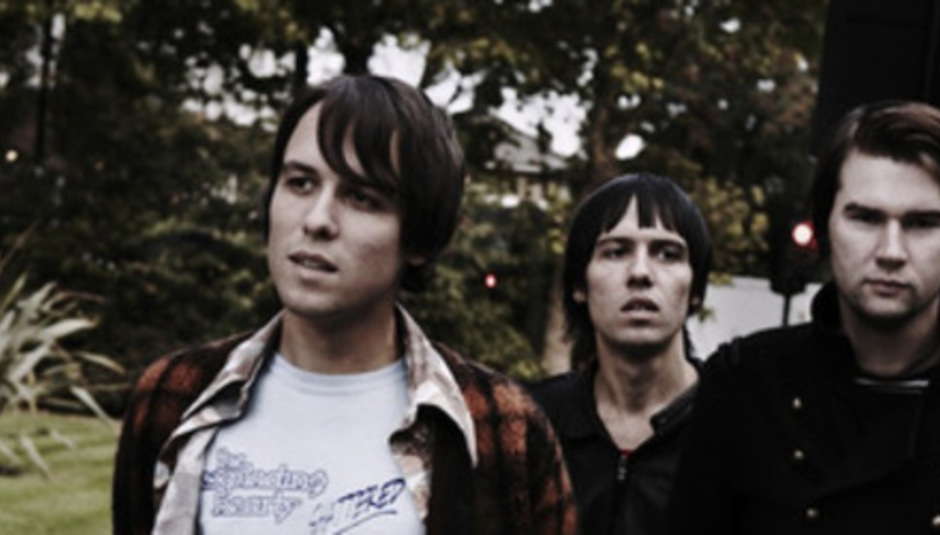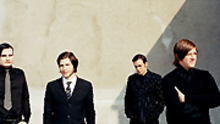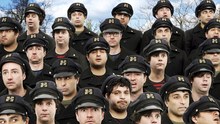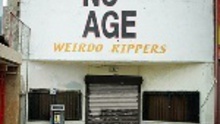Eschewing Germanic fairgrounds, North American swimming pools, and the grip of Warner Bros Records, Ryan Jarman from The Cribs explains how he and his brothers found themselves reconnected...
In The Belly Of The Brazen Bull...
Cue 20th Century Fox title sequence. “Dlllllllllllaaaa-duh-dah. Dun-dun...”
So, we make some small talk through the office phone's loud-speaker to an English mobile in Germany, and mess about trying to get my iPhone to record the results. It makes sense to pick the conversation up here...
RJ: …a Ghost Train, that kinda stuff.
DH: So, you’re basically at the circus?
RJ: Well, not really…
And then, as unlikely as it sounds, with absolutely no prompting, Ryan launches into this...
RJ: For the last two records we were on Warner Bros. That, kind of, hampered what we could do really. We didn’t really tour in Europe hardly at all on the last record. We only toured once on the last record. And cos we’re just now back to doing whatever we want, we’re just in the van doing everything DIY again.
DH: Your own way?
RJ: Exactly. It’s much better. And I don’t understand why people would do it any other way in this day and age. With the climate [of the music industry] being the way it is there’s nothing… It just makes more sense. We’ve got a van in Europe and a van in America now. We can tour whenever we want.
DH: I think your signing to Warner Bros, particularly given your influences, is the same kind of thing as why it made sense for Sonic Youth to sign with Geffen; To treat it as a pop-art experiment where you flirt with the devil and see what you could do with that backing and that budget. If you’ve got the chance to do that you may as well do it. The fact that it didn’t work out and that you managed to get out of it [so easily] is a real touch.
RJ: I think we managed to get out of it, not for any other reason other than the situation had become unworkable. We weren’t comfortable bedfellows whatsoever. They knew it as much as we did. When we wanted to do a single on Kill Rockstars, bizarrely, [We said] Kill Rockstars want to do a single and Warners were like: “Oh, that’s fine”. Y’know… Man, if you guys were really that bothered [about the Cribs] I don’t think you’d like that we were doing a single on another label so we knew then. I dunno… it was tough being on that label. We didn’t really feel like they brought anything to the table and they actually stopped us doing things. If we wanted to jump in the van and do a tour they wouldn’t let us do that and we didn’t understand that at all. I’ve always felt that, for us, that the best way of us promoting ourselves has always been through touring. That’s always been the mindset we’ve had. It’s nice to be back in that situation now where we can do that again.
DH: I think it’s a minor miracle that you wangled yourselves out of that then. Anyway, so the new record…it’s fucking good…
RJ: That’s awesome, man. I’m glad that people like it. I spent so much time working on it. I was obsessed with it when we were writing it and recording it. It’s weird when other people start hearing it cos you think: “I hope they like it in the way I do” so it’s nice for people to say that, man. You normally get some journalist saying: “We really like the new record” and I’m like: “Do ya? Or are you just saying that?”
DH: Definitely. When you’re writing and recording a new record you’re definitely too close to it to be fully objective. More than that, if you’ve had a level of success - let’s take The New Fellas and the songs that did really, really well off Men’s Needs, Women Needs, Whatever - they’re a certain kind of song, like the song 'Men’s Needs', or 'Hey Scenesters!'. They’re snappy indie disco songs. With most of the stuff on Ignore the Ignorant it was a lot more delicate and crafted. With ‘Chi-Town’ and, to an extent, 'Come On Be a No One', they’re red herrings really, cos this album is as delicate and as crafted [as Ignore the Ignorant].
RJ: Well that’s kind of what we did. We put out those ones cos, if we were to cater to anyone, it’d be hardcore fans. I know that they’ve been wanting us, or willing us to have a return to the full-on punk rock. So we put those two out first and people think: “Oh yeah. That’s where they’re coming from” and then hold all the more expansive stuff for the album so that when people get it you’re not just picking up eleven two dimensional, three minute pop-punk songs cos, for us, that’s not something we’re interested in doing at all. That’s not what we listen to. We like things to be more experimental and more…I dunno… I know what you mean about those two being like a red herring cos, though the album isn’t just songs like ‘Chi Town’, I think the spirit is back to what it was. The spirit of the stuff is more akin to the stuff from the first albums, but the songs are definitely not regressive. It’s kind of a tricky line to walk.
DH: Yeah, it definitely is. The recording of it seems more stripped back than Ignore the Ignorant but the songwriting seems more clever. You’re still putting things through effects - it’s not a total rejection. It gives it a feeling of depth but the recording somehow seems more raw.
RJ: It’s more organic really. The last record, as much as I enjoyed making it at the time, is a little too clean for my taste, or what I would listen to. With this record we definitely wanted to go back to a more organic approach. For us, the main thing was making sure all the songs were completely finished, totally rehearsed in the rehearsal room before we went in the studio so that we could spend less time in the studio. Setting it up and recording it live. And do it all to tape rather than people sat around cutting it all up on ProTools. I don’t enjoy that process and I don’t think of it as being particularly artistic either, y’know? You should spend more time in the practice room than in the recording studio. In this day and age, when digital recording is so easy that’s part of the craft that people have forgotten about. It’s in the rehearsal room where the vibe of the song comes from or where the spirit comes from y’know?
DH: Ok. I don’t think that the last two albums are particularly dissimilar sounding but with Nick Launay was it a lot more considered? Was it much more drawn out? Was he a lot more producer-ly?
RJ: It was just a very long process really. Obviously, we had Johnny in the band and he likes to really layer his guitars. My approach to guitars has always been to write a really good, simple riff. Well, not simple, but the ultimate melodic riff and once I’ve got that I don’t want to layer it. I just want there to be that one main guitar. When we did the last record there was a lot of little production things. Nick is an old-school producer in that he has quite an old-school approach to recording but it just took. A. Long. Time. It felt like we were in the studio for too long but we weren’t playing. I don’t mind being in the studio as long as I’ve got my guitar on all the time but there was a lot of hanging out around the pool. [LAUGHTER, MAINLY FROM ME]. Y’know, its nice and you can’t complain if that’s your job, but, and I’m not dissing Nick cos he’s a really great producer, but, for me the way we’re functioning is back to our original ethic. Just hard work, a DIY ethic. It’s not quick like were tossing something off, just direct. That direct approach.
DH: Well the writing process must have affected that. You and Gary going off into the desert...
JH: Well, when Johnny [Marr, obvs] left it was about recapturing the essence of why we’d started in the first place. Men's Needs had commercial success, which wasn’t something we’d ever factored in for our band. That the song and the album would be played on the radio. That was a game-changer. All of a sudden you’d slightly deviated off the path and you don’t realize it. When Johnny left we were like: “Hang on.” We’d definitely drifted off the path we were on to begin with. So we went on road trips, stayed in really skanky hotels, took our guitars with us and just hung out really and listening to a lot of music. Just reconnected with what the essence of the band was in the first place; what we were about. Then, when we came back we had a really good idea of how the record was gonna turn out. We knew we were gonna work with Steve Albini, we knew we were gonna work with Fridmann. We already had songs written. We had ‘Back To The Bolthole’, we’d written that in a motel. It maybe wasn’t a case of writing with this in mind but we suddenly realized that we had drifted. Most bands think that if you’re getting bigger all the time, then that’s the ultimate goal but it’s not. To us that’s not the ultimate goal. We were happy with how the fourth album turned out and it did do well. It got well reviewed and it was fun to play with Johnny, but it had drifted and it was time to re-stamp the personalities of us three brothers, these three weirdoes from Wakefield - these mosher kids - back onto the band, y’know?
DH: Life on the road can erode any kind of relationship. Did you find that you and Gary and, to an extent, Ross had to put effort into going back to what the Cribs were, in relation to each other as individuals, to make a new record?
RJ: I don’t think so. I think it was instinctual that we all wanted that after Johnny left. Toward the end of touring the fourth album I could see in Gary, and we don’t have to speak about these things, that he was wanting to go back to the way we used to be. Part of it was that for the first few records we had our own practice studio, which we didn’t have for the fourth record. We were doing that in proper rehearsal rooms, which isn’t our natural environment. Ross built a practice room in his garage, Gary had a basement in Portland. This is where we can practice and write, we can do it all night, it’s not professional, we’ve got a four-track, we’re at home, it takes all the pressure off. It was nice. The writing process was natural cos we were in our own homes. It just felt much more natural. Not a reaction. Just a case of what we’d done in the past. Back to our natural environments, really.
DH: So, you had an inter-band shift back to your roots, a business/record company shift back to your roots, and yet, the new album still sounds like the next step forward, irrespective of back story.
RJ: The main thing is to make sure we progress. I would never ever ever... Even when you get into this talk of doing things more organically, more who we were in the early days, as much as I say that, there’s no way I’d wanna make anything regressive. I just wouldn’t have the incentive. I couldn’t purposely make something that was backwards thinking or a rip-off of the first couple of records. We always wanna be moving forward. That’s what keeps us going really.
DH: It’s easy to fall into that groove where it’s comfortable and is selling and it’s easier to stick to that. It’s not like Nicki Minaj is Damon Albarn. Anyway, how did the Abbey Road medley come about?
RJ: Me and Gary had been going on these road trips – I was on holiday, I wasn’t going over there to write or work - and we kinda had all of these bits of songs left over from there. We kind of forgot all about them until we’d done the first session with Dave Fridmann. We listened back to the Dictaphone and thought “Oh, we should have finished that, we should’ve turned that into a song” but we didn’t have time so we came up with the idea that we’d string them all together into this one big song. I don’t know whether or not it works, whether one bit flows into another but we’d had the idea and we thought we’ve got to try it, we’ve got to give it a go. It turned out Abbey Road would be the cheapest as long as we produced it ourselves. So it seemed cool. Ross is a big Beatles fan but we didn’t know if we were gonna be able to do it. We recorded across 192 channels in Abbey Road and we managed to get it done.
DH: It’s the least Cribs-y idea and certainly not Cribs-y if you guys are at the controls. Particularly given the legacy of the studio - it’s bonkers that you’ve made it work.
RJ: Yeah, we didn’t know if it was going to work. We’re proud of how that song came out cos at least we tried it. Its not exactly the kind of thing that people would associate with our band but I hope that…I just hope that people appreciate it for what it is really cos a lot of work went into it. A lot of thought and a lot of work.
DH: You have a history of a few stand-alone singles and an admirable amount of excess material from the Albini sessions and the Dave Richards session. It’s great that you’re stockpiling stuff, not thinking: “Bosh it out cos it’s there”. Thinking about things more creatively. The bigger, more modern picture.
RJ: Well, record ‘em when you’re excited about ‘em. There’s a song, which was the last song Johnny was on, called: ‘Leather Jacket Love Song’, which I really like, but because it was recorded a while ago I don’t know when that’s gonna come out, if that’s even gonna come out. Three songs from Albini stuff, another couple from the Dave Fridmann session but I feel like that, cos the Albini session was the last session for the album, I almost feel like once this album’s done and dusted we’ll probably pick up where we left off and finish stuff off with Albini cos his way of working is directly in line with our way of working at the minute. The only reason we didn’t put those songs on this album was cos we felt it was the germination of a new album. We love the songs so we’ll go back to them and work on them with him I would think.
DH: So you’re anticipating another record coming out quite quickly?
RJ: Yeah, we’re still writing little bits and pieces at the minute. I can never say definitively whether we’re going to go straight in and make another one but we’re still in that mode at the moment.
DH: Are you the kind of band that when you’re on the road, say you’ve got four days off in Chicago, you’ll get a studio booked and put down a few ideas?
RJ: No, not really. We’ve done that a couple of times. I don’t like writing on the road. I don’t enjoy it. When you’re on the road you have a bit of a clouded perception of what the songs are. If you write songs at home there’s a really harsh kind of sound, rather than writing songs on stage in a soundcheck. You get a better idea of whether they’re going to work or not. Or you might be enthused on something that isn’t that good cos of the environment.
DH: Also, when you’re on the road you’re in this ridiculous bubble. Riders, the hours and whatever else. Even if you’re not a big drinker or whatever, you do go much more loopy than you would if you were at home. You’re let off the leash in that respect. It’s hard to get perspective...
RJ: Yeah.
DH: The lyrics on this album, both yours and Gary’s, deal with self-doubt and uncertainty. You’re definitely taking your own personalities apart and assessing them. Perhaps too much at times...
RJ: We see it as completely the other side to writing the music. We will really spend a long time working on the lyrics. Not showing them to anyone, being really precious about them. Not showing them to each other. I feel like people will know too much of what’s going on in my head if I let them listen. And I don’t really want people’s opinions on it until they’re actually finished. We spend a long time pouring over lyrics. Not in a way where you over-think them. For me, I always wait until I get one hooky line, one line that really sums up what the song’s about, then I can build around it. For this record, my way of writing, and I can’t say if it’s the same for Gary or not cos we don’t discuss these things, but I try and be as honest and as stripped-back as possible. And a lot of the lyrics are to do with feelings of inadequacy, yeah, stuff like that. Just what goes on in your head. I struggle with those things everyday. I get battered around the head with people giving me crap for my haircut, or this or that. I’m a very self-critical person now from listening to that for such a long time. And people say: “Who gives a fuck? It should be water off a ducks back. Stop being so shallow” but long term stuff like that does permeate - it leads to feelings of self-doubt. We’re very shy, introverted people and we don’t have that much self-confidence.
DH: From knowing you guys a bit socially, you’re not particularly extrovert people. It’s sort of a paradox that all three of you are retiring and a bit guarded but at the same time obviously smart and into what you’re doing. And that’s where the paradox comes in. There’s an element you must get off on with the need to go out on stage every night and put yourself out there and, I dunno, have a fringe or whatever, y’know? Is that an internal struggle for you?
RJ: There is a paradox. Because we are quiet, introverted people as a result of that and of growing up in Wakefield and feeling like outsiders, as a result of that feeling of being isolated, you start to develop very strong feelings, very passionate feelings about other things, about some of the injustices you might see going on. We’re very passionate about being against sexism cos that’s something we’ve been subjected to a great deal. You get all these things you become passionate about so you might be an introverted person but once you start voicing these opinions, especially when you’re in a band, people assume that you’re super-confident and mouthy. People have described us as being mouthy. I’m not mouthy. I have things that I will discuss but a lot of these feelings and opinions have been born out of the fact that, generally in life, I’ll sit on the sidelines [and watch things happen]. I think we’ve really struggled with people perceiving us wrong because we are opinionated.
DH: You’ll seem outspoken cos you’re already on the pedestal and there’s no point on being there unless you do have something to say.
RJ: If you know that you have people who listen to you, your fans, or anyone, people who care what you’re going to say then you should try and turn people on to good causes, things that you think are of worth.
DH: There’s that lyric in ‘Confident Men’ about sitting on the bollard and not moving, and “I would have kissed you but the moon was there”. That’s a very introverted, shy way of being.
RJ: Well, those are Gary’s lyrics, but I think that both me and Gary try to be less guarded and more honest in our lyrics. At this point, five albums in, it’s about hoping that people understand us a bit better. That’s what we do when we put out records. We just want people to understand where we’re coming from. It rarely happens but...
DH: It’s odd that the lyrics are so good but the balance, sonically, means that they’re hidden a bit. The way they fit rhythmically, where the words fall, is brilliant, and you wouldn’t mix the record any differently but...
RJ: A lot of the records we listened to as teenagers, you couldn’t necessarily work out the lyrics and that’s one of the reasons why we’ve always had them in the liner notes. When you’re listening along to the record and reading the lyrics and being like: “Ah, I’ve always wondered what that line was”. Although, I don’t like stuff to be too upfront and a few years ago there was definitely a trend of being super-dry, super-upfront, and it was very worthy. I’m not really a big fan of that, I think you should definitely have to work a little bit or do a little bit of digging, y’know?
DH: If I was listening to, say, Elastica as a kid, reading the reviews would get me into Wire, which would get me into the Slits, and so on. There’s a path to be trodden there. This goes back to Record Store Day and having a physical product, something tangible...With Pulp, they’d have a note inside their albums saying “Don’t read the lyrics whilst listening to the music”, which I don’t agree with, and it’s a rule that I’ve always flouted, but it’s an interesting idea.
RJ: Well, I can understand why they’d say it cos maybe you’re not going to appreciate the song as a whole, it feels like you’re studying it, but i think you should do it at least once.
DH: But the flipside of it is that you end up reading the lyrics as though it were an essay. There’s an element of self-elevation there as well. At the end of the day, it’s pop music and it comes as a whole.
In The Belly Of The Brazen Bull is out now.























